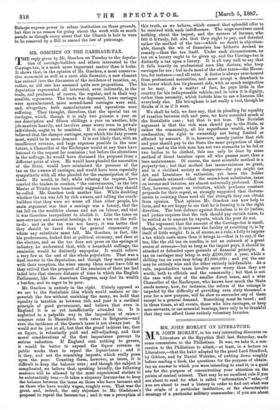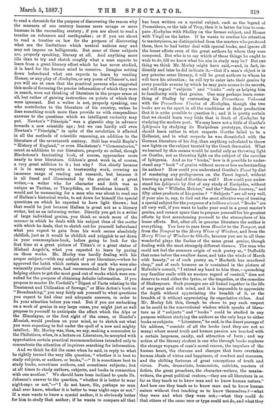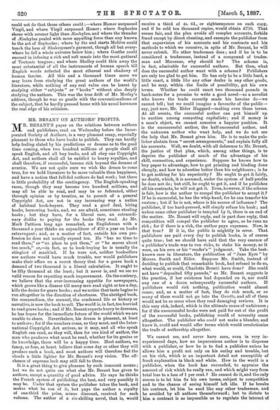MR. JOHN MORLEY ON LITERATURE.
14 R. JOHN MORLEY, in his very interesting discourse on ../XL Literature at the Egyptian Hall last Saturday, made some concessions to the Philistines. It was, we take it, a con- cession to the Philistines to admit,—at least, in a lecture on Literature,—that the habit adopted by the great Lord Strafford, by Gibbon, and by Daniel Webster, of putting down roughly before reading a book, the questions for the purpose of obtain- ing an answer to which you were intending to read it, is a good one for the purpose of concentrating your attention on the points of central interest. That may be an excellent rule if you are about to read for what is called "information's " sake,—if you are about to read a history in order to find out what was the origin of a particular institution, or the characteristic strategy of a particular military commander; if you are about
to read a chronicle for the purpose of discovering the reason why the manners of one century became more savage or more humane in the succeeding century ; if you are about to read a treatise on volcanoes and earthquakes ; or if you are about to read a treatise on law for the purpose of discovering what are the limitations which neutral nations may and may not impose on belligerents. But none of these subjects are, properly speaking, literary at all. And anything more idle than to try and sketch roughly what a man expects to learn from a great literary effort which he has never studied, it is hard for the human mind to conceive. Imagine setting down beforehand what one expects to learn by reading Homer, or any play of 2Eschylus, or any poem of Chaucer's, and you will see at once that the practical persons who suggested this mode of focussing the precise information of which they were in search, were not thinking of literature in the proper sense at all, bat rather of gaining instruction on points of which they were ignorant. But a writer is not, properly speaking, one who contributes to the literature of his country, unless he does something much more than provide us with compendious answers to the questions which an intelligent curiosity may put. Newton's "Principia" was a gigantic step in advance towards a new scientific age ; but we can hardly call even Newton's "Principia," in spite of the revolution it effected in all the methods of scientific reasoning, an addition to the literature of the seventeenth century. Still less would Rapin's "History of England," or even Blackstone's "Commentaries," count as additions to our literature, properly so called, though Blackstone's fascinating book, of course, approaches more nearly to true literature. Gibbon's great work is, of course, a very great addition to it ; but why ? Not chiefly because it is in many respects a trustworthy work, covering an immense range of reading and research, but because it is all fused and illuminated by the genius of a great writer,—a writer who for character and drift was as unique as Tacitus, or Thncydides, or Herodotue himself. It would not be unmeaning for a man who was about to read one of Hallam's historical works, to set down for himself the special questions on which he expected to have light thrown ; but that would be just because Hallam is great not as a literary writer, but as an informing writer. Directly you get to a writer of large individual genius, you think so much more of the manner in which be deals with his subject than of the matter with which he deals, that to sketch out for yourself beforehand what you expect to gain from his work seems absolutely childish, just as it would be childish and priggish to set down in your commonplace-book, before going to look for the first time at a great picture of Titian's or a great statue of Michael Angelo'e, what you expected to learn by gazing on those works. Mr. Morley was hardly dealing with his proper subject,—with any subject of pure literature,—when he approved the habit which certain men of mark who were also eminently practical men, had recommended for the purpose of helping others to get the most good out of works which were con- sulted for the purpose of obtaining definite information. If you propose to master Dr. Corfield'e " Digest of Facts relating to the Treatment and Utilisation of Sewage," or Miss Acton's book on "Breadmaking," you may fairly ask yourself to what questions you expect to find clear and adequate answers, in order to fix your attention before you read. But if you are embarking on a work of genius in any large sense, you might just as well propose to yourself to anticipate the effect which the Alps or the Himalayas, or the first sight of the ocean, or Handel's Messiah, would produce on your mind, as to sketch out what you were expecting to feel under the spell of a new and mighty intellect. Mr. Morley was, then, we say, making a concession to the Philistines, when, in a lecture on Literature, he accepted with approbation certain practical recommendations intended only to concentrate the attention of inquirers searching for information.
And we think he did the same when he said, in reply to what he rightly termed the very idle question, " whether it is best to study subjects, or authors, or books,"—" It is sometimes beet to study books, sometimes authors, and sometimes subjects ; but at all times to study authors, subjects, and books in connection with one another." We should have been inclined to quote Dr. Johnson's answer to the question, "whether it is better to wear night-caps or not,"—" I do not know, Sir, perhaps no man shall ever know, whether it is better to wear night-caps or not." If a man wants to know a special author, it is obviously better for him to study that author; if he wants to compare all that has been written on a special subject, such as the legend of Prometheus, or the tale of Troy, then it is better for him to com- pare Aschylus with Shelley on the former subject, and Homer with Virgil on the latter. If he wants to confine his attention to masterpieces, as distinguished from the masters who produced. them, then he had better deal with special books, and ignore all the lesser efforts even of the great authors by whom they were composed. But who is to say which of these things he ought to wish to do, till we know what his aim in study may be ? But one thing we think Mr. Morley might have said,—and, in fact, in- directly and later he did indicate it,—that if a man's object is in any genuine sense literary, it will be great authors to whom he will turn his attention ; he will try to enter into their genius by every possible avenue by which he may gain access to its secrete, and will regard "subjects " and " books " only as helping him to familiarity with that genius. One may perhaps learn some- thing of Shelley by contrasting his Prometheus Unbound with the Prometheus Iinetue of ./Eschylas, though the two books are so far apart in all the conditions of their production that it is quite possible to question it ; and it is pretty certain that we should learn very little that is fresh of ./Eschylue by studying the modern poet. We may learn not a little of Goethe's Iphigenia by studying its Euripidean prototype, though we should learn rather in what respects Goethe failed to be a Hellenist, and in what respects he was dissatisfied with the German literature of his day, than anything calculated to throw new lights on the subject treated by the Greek dramatist. What we learned by this means would be neeful only as throwing light on Goethe, not as throwing light on the subject of the sacrifice of Iphigenia. And as for "books," how is it possible to under- stand any " book" of genius without more or less understanding its author ? How could you understand Goethe's Faust by dint of mastering any prolegomena on the Faust legend, without knowing a great deal of Goethe as well P How could you under- stand his Iphigenia by dint of any study of Euripides, without reading his " Wilhelm Meister," and the "Italian Journey," and fifty other products of his genius P " Subjects" are all very well, if your aim is, say, to find out the most effective way of treating a special subject for the purposes of a tableau vivant. " Books" are all very well, if you want to bathe your soul in a great master's genius, and cannot spare time to prepare yourself for his greatest efforts by first accustoming yourself to the atmosphere of his lesser efforts. But, after all, in genuine literature the author is everything. You love to pass from Hamlet to the Tempest, and from the Tempest to the Merry Wives of Windsor, and from the Merry Wires of Windsor to Othello, because you see in all these wonderful plays the flashes of the same great genius, though dealing with the most strangely different themes. The man who could not feel the oommon origin of such poetry as, " Daffodils that come before the swallow dares, and take the winds of March with beauty," or of such poetry as, " Macbeth has murdered sleep," and of such humour as is contained in the picture of Malvolio's conceit, "I extend my band to him thus,—quenching any familiar smile with an austere regard of control," does not deserve to read either the lyrics, or the tragedies, or the comedies of Shakespeare. Such passages are all linked together in the life of one great and rich mind, and it is impossible to appreciate the depth without appreciating the breadth of it, or the breadth of it without appreciating its superlative riches. And Mr. Morley felt this, though he chose to pay such respect as he could to the conventional wisdom which speaks of litera- ture as if " subjects " and " books " could be studied to any purpose without studying the authors as the only keys to either books or subjects. " Literature," he said, in the finest passage of his address, "consists of all the books (and they are not so many) where moral truth and human passion are touched with a certain largeness, sanity, and attraction of form ; and my notion of the literary student is one who through books explores the strange voyages of man's moral reason, the impulses of the human heart, the chances and changes that have overtaken human ideals of virtue and happiness, of conduct and manners, and the shifting fortunes of great conceptions of truth and virtue. Poets, dramatists, humourists, satirist°, master& of fiction, the great preachers, the character-writers, the maxim- writers, the great political orators,—they are all literature in so far as they teach us to know man and to know human nature." And how can they teach us to know man and to know human nature without first teaching us to know themselves ?—what they were and what they were not;—what they could do that others of the same race or type could not do, and what they could not do that those others could ;—where Homer surpassed Virgil, and where Virgil surpassed Homer; where Sophocles shone with serener light than 1Eschylus, and where the thunder of tEschylus pealed with more appalling force than any known to the art of Sophocles ; where by fits and starts Moliere could touch the hem of Shakespeare's garment, though all but every- where be fell a whole universe below him ; where Goethe could succeed in infusing a rich and soft• music into the most guttural of Teutonic tongues ; and where Shelley could thin away the most substantial of all the instruments of human speech till English words reflected the most ethereal and shadowy of human fancies. All this and a thousand times more we may learn from studying the great authors of the world's literature, while nothing of any real value can be learnt by studying either " subjects " or " books " without also deeply studying the authors. This was the true drift of Mr. Morley's address, though he was so gentle with the conventionalisms of the subject, that he hardly pressed home with his usual keenness the real edge of his criticism.




































 Previous page
Previous page